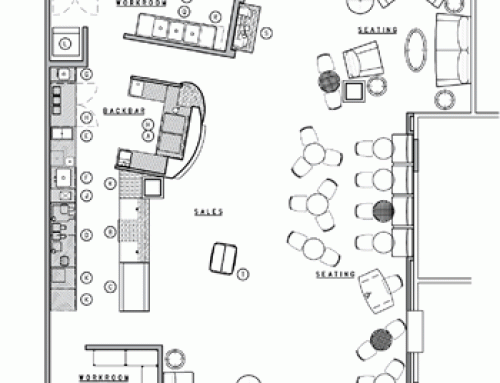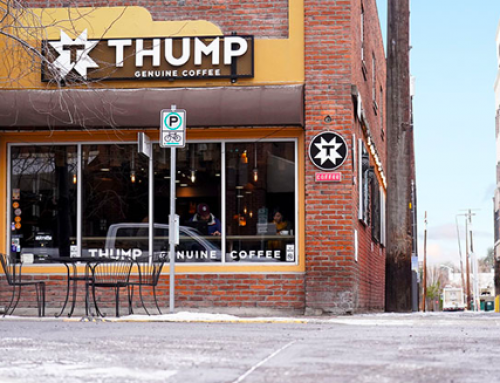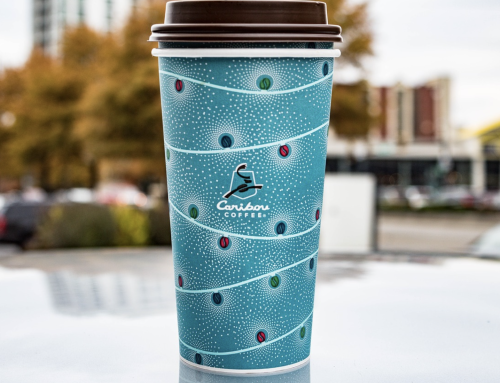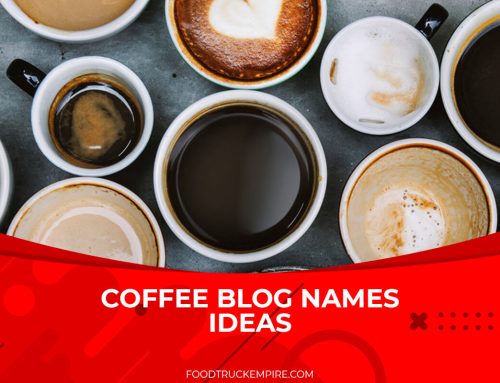Want to start a coffee business, but aren’t exactly sure where to start? This in-depth guide outlines the most popular options, realistic revenue expectations for each business, and resources to help you take the next step in the startup process.
According to the National Coffee Association of the USA, consumers spend more than $74 billion on coffee each year. The industry is also responsible for nearly 1.7 million jobs in the United States alone. Needless to say, you’ve picked a market with strong consumer demand. But that doesn’t mean staring a profitable business in this category is going to be a cake walk.
Ready to begin the search for your business opportunity? Pick from the list of options below to dig in.
- Coffee Shop
- Coffee Truck
- Mobile barista for hire
- Coffee brand
- Flavoring and sweeteners
- E-commerce store
- Coffee Producer or farmer
- Coffee media company
- Become a roaster
Start a Coffee Shop
If you’re thinking about getting into this business, starting a coffee shop is the first business that comes to mind for most people. There’s a certain romanticism about owning a coffee shop. You get to build a cozy little meeting spot, get to know people, and produce fine beverages and small meals for customers. You might even be able to imagine yourself operating the business or selecting the perfect furniture or cozy fireplace for the shop.
But be careful! Don’t get caught up in day dream, imagining what running a coffee shop will be like that aren’t based in reality. This is a competitive industry with established brands competing for market share like Starbucks, Dunkin’ Donuts, and probably some regional players near you. There are also options like McDonalds that frequently offer any size coffee for $1 to compete on price.
These global brands have spent decades marketing to consumers and becoming a habitual destination when you need a cup of coffee. You, on the other hand, will be starting out with zero name recognition and limited marketing budget. You’ll need to work hard to get customers through the door for the first time.
Best List: 257 Coffee Shop House Names with Profit Potential
Still here? Good! All this information isn’t meant to discourage you, but to set you up for success.
Operating a coffee shop requires the same level of commitment to operating as any food service business. You’ll be working with suppliers, roasters, handling customer service issues, trying to get orders out as quick as possible, hiring employees, paying taxes, doing bookkeeping, getting business licenses and the 1,000 other things small business owner needs to do.
If this sounds stressful, you’re right! But that doesn’t mean operating a coffee shop can’t also be 100% fulfilling and the right choice for you. It’s our moral obligation to share the good and bad of operating a business so we highlight both sides. If you want to open a coffee shop, check out our detailed startup guide.
Revenue Expectations / Cost to Start:
According to Bryan Reynolds, co-founder of Anthem Coffee, their top producing store generates over $1 million dollars in annual sales. Anthem Coffee also sells beer and food items to bolster sales during the evening hours when most coffee shops are closed. Keep that important distinction in mind.
In your first year, it’s extremely unlikely you’ll reach anywhere near $1 million in sales. But it is a benchmark to aspire to and demonstrates what’s possible in this industry with a single store. Here are the revenue expectations and startup costs you can expect with this business. Click here for a detailed breakdown of costs by line item.
| Annual Revenue Range | $200,000 – $1 million |
| Estimated Startup Cost | $250,000 – $1 million |
Start a Coffee Truck
A lower cost alternative to opening a retail store is to start a coffee truck. You can purchase a fully equipped truck, purchase business insurance, and cover licenses for well under $100,000 in most areas. You can view examples / prices of used coffee trucks currently for sale in our marketplace.
Opening a coffee truck can be a smart option, not only because of lower startup costs, but because it’s a business you could start on the weekend while holding down full-time employment if needed. Keeping your job maintains a cashflow cushion while opening a business so you can gradually ween yourself off full-time employment.
There’s also the benefit of not being tied down to a single location. One of the biggest risks you’ll take as a coffee shop owner is finding the right retail location. As you know, the demographics of cities change over time. Being locked into a single location with a longterm lease can be a major risk if you rely on foot traffic from an anchor store in a strip mall to generate business.
As we’ve seen with shopping malls right now, they were a terrific place to start a coffee shop 5 – 10 years ago. I don’t know if you’ve heard, but malls are were you want to be right now as a business owner. Coffee trucks allow you to be more nimble and drive where the business is each day.
Check out our comprehensive guide that includes an audio lesson on starting a coffee truck. Estimated startup costs and revenue are listed below. These revenue estimates are highly dependent on your own personal effort, of course. The more you go out to vend the more you’ll make in this business. If you’re not working, you aren’t making money.
| Annual Revenue Range | $20,000 – $200,000 |
| Estimated Startup Cost | $40,000 – $125,000 |
Mobile Barista For Hire
If you need to start a coffee business on an extreme budget this is the best option for you. As a mobile barista, you essentially hire out your time to work at events like weddings or corporate functions. This is a good way to generate some quick cash, learn more about the industry, and figure out if this really is the type of business you’d like to operate on a larger scale in the future.
There are a few different iterations of this model you can use. First is getting paid for your time similar to a bartender would.
But you could also invest in a low-cost coffee cart for under $5,000 to begin doing some small scale weddings or events. The nice thing about a coffee cart is that you can often pay off all your equipment costs in just a few events. If you’re operating as a sole proprietor, you can even “double dip” by getting paid for the event and setting out a tip jar.
To view our complete plan for starting a coffee shop on less than a shoe-string budget, read our complete guide here. Follow this plan from start to finish and you’ll go from vending at farmer’s markets to opening the doors to your own coffee shop within a few years.
| Annual Revenue Range | $10,000 – $50,000 |
| Estimated Startup Cost | $0 – $6,000 |
Starting a Coffee Brand
If your goal is to start a really big business than building a brand is the path for you. In reality, all of the business opportunities listed in this guide require some level of brand building. But for the practical purposes of this guide this is the most ambitious option.
A coffee brand could mean making and selling your own brand of coffee beans. Or creating a national chain like Caribou Coffee. With a brand you can sell coffee, t-shirts, mugs, sweeteners, specialty creamers and just about anything else you can think of within the vertical.
The best example I can think of to demonstrate building a dominant coffee brand is from Dave Asprey, founder of Bulletproof Coffee. Dave started his company with a podcast and his blog talking about how he used a specific coffee recipe that provided numerous health benefits. It took years of publishing and blogging to build up the brand, but the company is now valued at over $50 million.
If you allow yourself to think bigger about a business than the sky is the limit in terms of potential revenue. As Dave’s example shows us, you can get started with publishing online and sharing your message for almost nothing thanks to social media, YouTube, and or a blog. Accomplishing results like this won’t be easy and isn’t realistic for everyone to expect, but many entrepreneurs will reach some level of success following this model.
| Annual Revenue Range | Almost limitless. |
| Estimated Startup Cost | Zero – Millions. |
Start a flavoring or sweeteners company
Of course you don’t need to serve coffee to make money in this industry. According to industry research firm Statista, over 173 million Americans used creamer in their coffee in 2019. That’s an incredibly big market to serve!
Here are a few ideas you could try that fit into this category:
- Specialty creamers with creative flavors like chocolate chip cookie or mint ice cream. Pick something decadent that you haven’t seen broadly available.
- Develop a sweetener that is a healthier alternative ingredients or is certified organic.
- Create a flavored coffee syrup. Even Starbucks is in on the flavored syrup game so you know this is a big market. Some industry reports estimate the value of the flavored syrup market to be $50+ billion in annual sales with projected growth for the coming decade.
Start a coffee farm
I feel like this is the least realistic option for most readers. To start a coffee farm you a.) need access to a lot of money to buy or rent land and equipment. b.) you’ve got to be in the right environment to grow coffee beans like Brazil or Hawaii.
Here is a terrific piece about a couple that bought a coffee farm in Brazil. As noted in the piece, most of these farms have been in operation for generations. If you have the inclination to start this business you’ll want to really do your research and talk to a lot of experts prior to making a purchase. In other words, you want to get to know the industry inside and out before diving into this complex business opportunity.
Start an e-commerce company
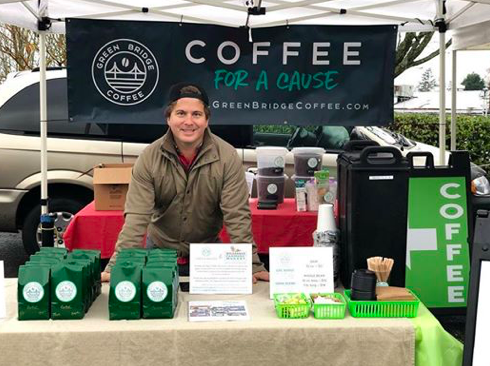
You could sell coffee online.
There are a lot of advantages to selling products online. Not only are startup costs much lower compared to opening a retail storefront, but you can tap into a global market of consumers too.
If you want to start an e-commerce brand, the most popular option for small startups these days is Shopify. Shopify makes it easy to set up an online store and accept payments even if you’re not a tech wiz. You can sell literally anything coffee related on this platform from coffee beans, to coffee makers, to mugs. The sky is the limit.
Another way to get started is becoming a seller on Amazon. This approach solves many of the logistic problems associated with running an e-commerce brand. You ship the product to Amazon and they’ll ship it out to customers for a fee.
Reader beware though… There’s a steep learning curve to this business model. You’ll need to have a passion for becoming a student of online marketing if you choose this path.
| Annual Revenue Range | Almost limitless. |
| Estimated Startup Cost | $10,000 – $60,000 |
Start a Coffee Media Company
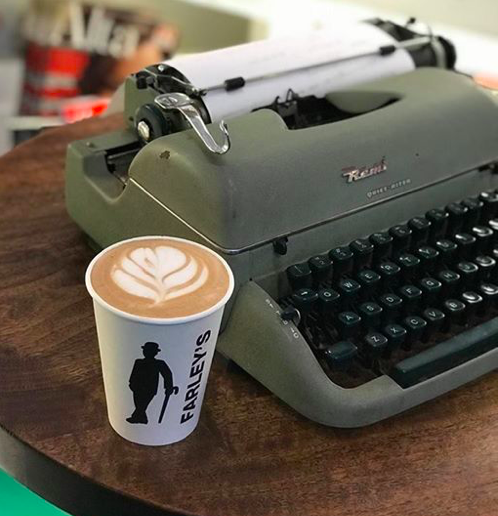
Coffee Publishing.
As the owner of a food business blog this is something I know a thing or two about. By another name, you could also call yourself a “coffee influencer” if this is the sort of business you want to build. Essentially, your time will be spent making videos, writing content, or recording podcasts on different topics related to coffee.
There are a few different approaches you could take with your content as a media company in this segment. Here are a few ideas:
- Review different blends of coffee, roasters, coffee makers and other products in this industry. There are a lot of products to review in this category and the segment is ripe with innovation so you’ll never run out of things to talk about.
- You could start a food blog instructing people on how to make all sorts of specialty coffee recipes from home. Cold brew, alcoholic coffee, Keto coffee… the ideas are limitless.
- Start a barista training blog and instruct others how to get a job in this industry and teaches how to make coffee. According to LinkedIn, at the time of writing there are over 60,000 open barista positions and some schools that offer training.
- Become a coffee industry magazine and provide data and insightful commentary and business forecasting data.
To a certain extent I run a coffee business blog, although the website covers many other food industries too.
Survey Results: Why Do Coffee Shops Fail? 232 Owners Share Top Reasons.
If you don’t fancy yourself particularly tech savvy, it may be a bit of a mystery how mini-media companies like this actually make money. But trust me, it’s not rocket science and there are only a handful of ways most websites or social media influencers make their living. The most popular ways to make money are:
- Advertising: You get paid for running ads on your website.
- Affiliate marketing: You get paid a commission for selling other people’s products on your website or social media account. For example, you could get paid $10 if someone buys a Grindmaster from your website.
- Selling products: You could sell coffee beans, filters, digital training products or consulting packages.
Disclaimer to our readers is that starting a website and trying to generate an income is going to take some time before seeing results. I invested about a year and a half before I made my first $500 month from the website you’re reading now. Only start this type of business if you’re prepared to be in it for the long haul and are really interested in the topic.
| Annual Revenue Range | Almost limitless. |
| Estimated Startup Cost | $0 – $1000 |
Become a Roaster
As a coffee roaster you’ll be in charge of taking raw coffee beans and turning transforming the raw commodity into a beverage that can be enjoyed by consumers. If you’re passionate about flavors and sourcing unique beans this could be the right business opportunity for you.
As you’ll learn in the video above, becoming a roaster will require warehouse space and commercial grinders that can produce espresso. This also takes a commitment to personal education on your end as you learn and understand the processing of roasting coffee.
This is another business opportunity on the higher end of capital requirements to start. Here’s some back of the napkin math on what it will cost to start a commercial roaster that’s certified with then Department of Agriculture.
- Commercial Roaster: $15,000
- Initial Inventory of Beans: $10,000
- Warehouse Lease: $1,000 – $2,000 per month
- Build out, Permits, Inspections of Warehouse: $5,000 – $10,000
One point I need to stress with all these business opportunities is that some ideas scale better than others. If you plan to open one retail coffee shop, your sales opportunities will be limited without opening more locations. If you sell coffee beans online, you’ve got an almost unlimited number of customers to draw from and can reach higher sales figures easier.
Before starting this or any business, make sure to get clear on your own personal goals. What type of a business would you have the most fun operating? How much money do you want to make to life comfortably? What’s your work experience? By taking the time to answer these questions honestly, you’ll set yourself up for success and be happier operating the business.
If you want to get access to interviews from proven food founders, I encourage you to sign up for our food business kit here. When you sign up you get instant access to our food business model canvas that will help build a detailed strategy for the launch of your coffee startup.

